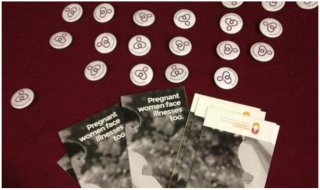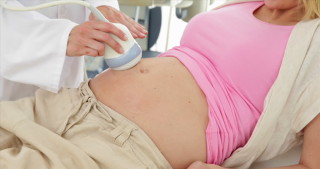 The Pregnancy Summit, held in London in early October, was an opportunity to hear about some of the latest science related to pregnancy and fetal health medicine. The Pregnancy and Medicine Initiative was present at the conference, which took place simultaneously with the first European Safe Motherhood Week, to help highlight some of the important work being done to improve pregnant women’s health and pregnancy outcomes.
The Pregnancy Summit, held in London in early October, was an opportunity to hear about some of the latest science related to pregnancy and fetal health medicine. The Pregnancy and Medicine Initiative was present at the conference, which took place simultaneously with the first European Safe Motherhood Week, to help highlight some of the important work being done to improve pregnant women’s health and pregnancy outcomes.
A common theme came though many of the talks that dealt with pre-existing or acquired medical conditions in pregnancy: the need to establish evidence-based treatment guidelines and to create patient registries to optimise treatment and improve outcomes for both the mother and the baby. Below are summaries of some of the presentations given at the Summit.
Treating Hyperemesis Gravidarum in a Day Case Setting
Caitlin Dean, Hyperemesis Nurse Specialist and Chair, Pregnancy Sickness Support, UK
Mrs Caitlin Dean made recommendations in implementing outpatient rehydration units in care centers and hospitals so pregnant women with hyperemesis gravidarum (HG) can quickly and effectively get treatment when then need it.
The social and emotional impacts of frequent hospital admissions for rehydration can have serious long-term implications for woment with HG, and in some cases lead to termination of wanted pregnancies, said Mrs Dean. There is no cure for HG, so managing expectations is important. However, treating HG with a rapid rehydration regime in a day case setting can lead to better pregnancy outcomes, improved mental health for the mother as well as cost savings for the hospital.
The Pregnancy Sickness Support, together with its academic and health practitioner partners, is working on establishing national guidelines for the treatment of women with Hyperemisis Gravidarum.
iHOPE: International Collaboration to Harmonise Outcomes for Pre-Eclampsia
Dr James M N Duffy, NIHR Doctoral Fellow, University of Oxford
Studies evaluating interventions for pre-eclampsia have reported many different outcomes, said Dr Duffy. Such variation leads to an inability to compare individual studies, limiting the usefulness of research to inform clinical decisions. The development and use of a set of core outcomes would help address these issues.
To define those outcomes, Dr Duffy has launched the iHOPE program, using an online Delphi survey to enable all stakeholders to participate in the process of establishing this agreed set of outcomes. With this, Dr Duffy aims to ensure that a minimum set of outcomes, important to all stakeholders, are routinely collected and reported in a standardised fashion. Once a set of measurable outcomes had been established, it will be easier to create guidelines for the treatment of hypertension and the prevention of pre-eclampsia.
Termination of pregnancy in women with medical conditions
Dr Babatunde A. Gbolade, Leeds Teaching Hospitals NHS Trust
Dr Gbolade explained that while most women requesting termination of pregnancy are healthy, a significant proportion of them actually are facing a variety of known medical conditions. Accessing services can be challenging for such women, as most free – standing independent services do not have the facilities and personnel to deal with potential complications linked to their condition. In the UK, these women are referred to NHS Hospitals, however the past decade has seen a steady decrease in terminations of pregnancy performed in NHS Hospitals. Dr Batalunde explained that this has resulted in less experience of late surgical terminations amongst NHS personnel, and described the protocol he has created for the NHS for an effective referral system.
Dr Batalunde also called for better data collection about women with medical conditions requesting termination of pregnancy and outcomes. Such a registry could feed the discussion about the need for better treatment options for pregnant women facing a medical condition.
Treatment of precancerous cervical lesions in the first trimester of pregnancy
Dr. Efraim Siegler, President of the Israeli Society of Colposcopy and Cervical and Vulvar Pathology
According to a population-based study in Canada, 3% of cervical cancers occur in pregnancy. However, current accepted guidelines for cervical lesions detected during pregnancy recommend treating only if invasive cancer is suspected.
Dr Siegler compared outcomes amongst 81 women diagnosed with precancerous lesions (CIN 2-3) during pregnancy, between those treated during the first trimester and those who were not treated. In his study, 41 women were treated within the first 16 weeks of pregnancy. Cervical cancer was diagnosed in 7.3%, of them. No complications to the pregnancy were observed post-surgery in any of the women treated, and 90% had on-term delivery. His conclusion was that women with evidence of precancerous lesions (CIN 3) need to be treated immediately, as their risk of developing cancer is great. In fact, he says, the likelihood that patients 36 or over will develop invasive cancer by the end of pregnancy is high, and therefore preventive treatment guidelines should be the same as for non-pregnant patients. Dr Siegler concluded by citing Hippocrates:
“Science is the father of knowledge, but opinion breeds ignorance” – For too many years, Siegler said, the treatment of pregnant women has been based on opinion, and it’s time for guidelines and decisions based on science.
Pregnancy outcomes in hemodialysis patients
Two presentations focused on the care and treatment of the pregnant dialysis patient, one from Dr Madeleine V. Pahl, M.D., Director of Research Operations Office for Translational Science, University of California and the other from Drs Mala Sachdeva, Jyotsana Thakkar, and Ilene Miller, Division of Kidney Diseases and Hypertension, North Shore-LIJ Health System, NY
Today, pregnancy is reported in 1-7% women on chronic dialysis. Outcomes in pregnant dialysis patients seem to be improving: from about 20% live births in the 1970s to over 50% today. However, official guidelines of care for dialysais patients in pregnancy are still not available said Dr Pahl.
According to an anonymous survey sent to US nephrologists, approximately 27% of respondents admitted to being somewhat to very uncomfortable caring for a pregnant woman on hemodialysis. In fact, 35% of the nephrologists surveyed recommended termination of pregnancy in dialysis patients. .
The survey also showed that there are no prescribed hemodialisis targets in pregnant women, and the treatment regimen therefore varies greatly across treatment centers. There are indications that intensive hemodialysis, which is a common treatment approach for the pregnant woman on hemodialysis, may lead to a significant number of poor maternal or fetal outcomes.
The two presentations showed that optimal care of pregnant dialysis patients is possible, with positive outcomes for both mother and child. According to the presenters, formal guidelines outlining the adapted care and dialysis targets for the pregnant woman on dialysis could substantially improve overall outcomes.
Placental dysfunction could lead to restricted fetal growth and maternal depression
Dr Rosalind M John, Cardiff School of Biosciences, Cardiff University, United Kingdom
More women experience depression and anxiety during pregnancy than in the postnatal period, says Dr John. Studies show that this increases the risk of fetal growth restriction and low birth weight, leading to higher risks of long-term mental health and metabolic issues in the baby.
 The placenta acts as an “endocrine pool” for the fetus, playing an important role in producing hormones that act on both the maternal and fetal systems to ensure a successful pregnancy. Dr John’s work shows that impaired placental signaling could cause both maternal mood disorder and fetal growth impairment. She also observed indications that the sex of the baby might influence the predisposition of the mother to experience depression in pregnancy.
The placenta acts as an “endocrine pool” for the fetus, playing an important role in producing hormones that act on both the maternal and fetal systems to ensure a successful pregnancy. Dr John’s work shows that impaired placental signaling could cause both maternal mood disorder and fetal growth impairment. She also observed indications that the sex of the baby might influence the predisposition of the mother to experience depression in pregnancy.
Management of antiepileptic drugs before and during pregnancy
Dr Anne Sabers, MD, DMSc, The Epilepsy Clinic, University State Hospital, Denmark
Managing antiepileptic treatment in women with epilepsy presents several unique challenges. For example, the efficacy of oral contraceptives can be affected by antiepileptic drugs, and the epileptic treatment can be less effective when paired with oral contraceptives. Similarly, pregnancy may reduce the efficacy of antiepileptic drugs and lead to aggravation of epileptic seizures. In addition, studies show that some specific antiepileptic treatments taken during pregnancy represent an increased risk of congenital malformations. Dr Sabers talked about the various potential treatment regimens she recommends for women of child-bearing age to ensure efficient treatment that remains safe for their future children.
Challenges of Inflammatory Bowel Disorder in pregnancy
Dr C. Janneke van der Woude, MD, PhD, Erasmus MC, Rotterdam, The Netherlands
Female patients with inflammatory bowel disease (IBD) face a lot of challenges and issues when they decide to conceive. Many IBD patients are diagnosed between the age of 20 and 40, and a quarter of IBD cases manifest before founding a family. Untreated IBD before pregnancy may cause miscarriage, according to Dr van der Woude. In fact, if the disease is active (“flare-ups”) at conception, there is a high likelihood of poor pregnancy outcome. By contrast, IBD patients in remission who maintain treatment throughout their pregnancy experience better outcomes. A healthy pregnancy with IBD is possible, concludes Dr van der Woude, with proper precounselling and planning.
“Current US Food and Drug Administration (FDA) drug classifications do not fully address the fact that the benefits of treatment of some chronic conditions might outweigh the risk of fetal drug exposure,” says Dr van der Woude.
Pregnancy exposure registries: challenges and health care provider involvement
Susan Sinclair PHD, MPH, RN University of North Carolina Wilmington, USA
Medication use in pregnancy is common, said Sinclair: 90% of women have taken medicines during pregnancy, 70% of whom in their first trimester and 50% of pregnant women fill a prescription with known or suspected fetal risk.
Counselling women about the safety of medication use during pregnancy is complicated by a lack of data necessary for an informed discussion, says Dr Sinclair.
Pregnancy exposure registries are increasingly being implemented to obtain more data about the safety of specific medication exposures during pregnancy. However, these observational studies focus primarily on the detection of birth defects, as well as fetal loss, prematurity, and infant neurodevelopmental outcomes. Additionally, the number of registries and the fact that they are not centralised creates confusion and difficulty in accessing the latest information.
Enrollment into the registries can be challenging, particularly if the pregnancy exposure is rare. Most pregnancy exposure registries rely on voluntary reporting by health care providers who have eligible women in their practice; participation is optimized through streamlined data collection processes requiring minimal time and resource involvement.
A centralised committee conducts targeted follow-up to evaluate potential causes of observed abnormalities and to establish the association between the development of the abnormality and the timing of the medication exposure. It is often not feasible to enroll a disease- matched unexposed comparison group, so population parameters or estimates from published studies may be used as an external comparison group. Many regsitries compare results to general population, but this does not constitute a reliable control group says Sinclair.
Pregnancy exposure registries are often slow to produce meaningful information, says Sinclair. Therefore health care provider communication and participation are critical for improving the quality and timeliness of information that can be used for evidence-based practice.
